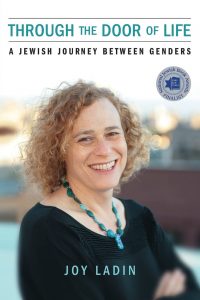Transgender and nonbinary people must familiarize themselves with anti-trans theologies and dialogue with religious conservatives to counter growing transphobic narratives, trans author and speaker Joy Ladin said.
Those with alternative sexual and gender identities also must see the religious and political rhetoric and actions directed against them are driven by an existential fear, Ladin said during a lecture hosted last month by Louisville Presbyterian Theological Seminary.
 “We can’t ask for understanding from those we don’t try to understand, or empathy from those we refuse to empathize with, or compassion from those we condemn, or respect for what our forms of gender mean to us without showing we know how much other forms of gender mean to them,” said Ladin, a poet and former English professor at Stern College for Women at Yeshiva University in New York, where she was the first openly trans scholar at an Orthodox Jewish institution. She also is the author of Through the Door of Life: A Jewish Journey between Genders and The Soul of a Stranger: Reading God and Torah from a Transgender Perspective.
“We can’t ask for understanding from those we don’t try to understand, or empathy from those we refuse to empathize with, or compassion from those we condemn, or respect for what our forms of gender mean to us without showing we know how much other forms of gender mean to them,” said Ladin, a poet and former English professor at Stern College for Women at Yeshiva University in New York, where she was the first openly trans scholar at an Orthodox Jewish institution. She also is the author of Through the Door of Life: A Jewish Journey between Genders and The Soul of a Stranger: Reading God and Torah from a Transgender Perspective.
Ladin came to the 2023 Pressler Lecture Series with ample expertise in confronting religious conservatives over her own transgender identity, starting with her 2008 experience rejoining the Stern College faculty soon after her transition.
“He’s not a woman. He’s a male with enlarged breasts,” the late Rabbi Moshe Tendler, then a dean at Yeshiva’s rabbinical school and a professor of biology and medical ethics, said in a New York Post story Ladin quoted during her lecture. “He’s a person who represents a kind of amorality which runs counter to everything Yeshiva University stands for. There is just no leeway in Jewish law for a transsexual. There is no niche where he can hide out as a female without being in massive violation of Torah law, Torah ethics and Torah morality.”
But support from some students and faculty helped Ladin through that episode and taught her that religiously motivated opponents need to be heard by the community they despise.
“Hard as that may be, I believe anti-trans theologies can teach us to address conservatives’ concerns about trans and nonbinary identities in ways that help them realize their own religious traditions offer capacious, compassionate and faith-strengthening ways to respond to them,” she said.
“They worry that people like me … are rejecting not just human biology or social conventions, but God, religion and the image of God in which we are created.”
For starters, that means grappling with Genesis 1:27, in which God is described as having created human beings in God’s own image, and as male and female. Religious conservatives go beyond the text, however, by concluding the text denounces anyone who denies the sex and gender roles into which they were assigned at birth, she said. “They worry that people like me, who reject binary identities, are rejecting not just human biology or social conventions, but God, religion and the image of God in which we are created.”
But there are alternative interpretations to that portion of Scripture, including from within the rabbinical tradition, she said. “We can also see gender identities, binary and otherwise, as ways of expressing who we know God made us to be, and as ways to fulfill religious principles such as honesty and authenticity. It also offers demonstrations of God’s boundless and ongoing creativity and of his revelations of the myriad ways God’s incomprehensible image can be manifested through our humanity.”
Scriptural arguments specifically against trans and nonbinary expressions also are relatively new developments for most faith traditions, Ladin said. “They are recently developed responses to the surge and acceptance of trans, nonbinary identities and secular culture and in less conservative religious communities.”
“The successes have made our identities a target for conservative media and politicians.”
Among the triggers of that development is the growing acceptance of LGBTQ people in society and institutions, she said. “The successes have made our identities a target for conservative media and politicians and have worked to inoculate conservatives against inclusion efforts by framing them as threats to conservative religious traditions and ways of life, rather than attempts to help a vulnerable minority share in the blessings religious traditions offer.”
Beneath it all is fear, Ladin said. “The fear that is driving the spread of anti-trans theologies is that trans and nonbinary identities conflict so profoundly with binary gender that it’s impossible to recognize them without destroying binary-based identities and ways of life. Many people, from religious conservatives to anti-trans feminists, see this fear coming true when binary terms such as ‘women’ are replaced by trans-inclusive terms such as ‘people who menstruate.’”
But Ladin said she has hope that some religious conservatives are open to theologies that embrace trans and nonbinary people as deserving of compassion.
One glimmer came in 2008 when numerous conservative rabbis and religious leaders defended her from critics who attacked her humanity as well as her trans status. Ladin said she has seen other instances in which religious conservatives have called for compassionate treatment of trans and nonbinary people, despite their gender and sexual identities.
“It’s a mistake to assume that all expressions of anti-trans theology are the same, or that everything they say reflects, and can be reduced to, the kind of reflexive transphobia that fueled Rabbi Tendler’s rage.”
Common ground also might be found by reminding conservatives that Genesis 1:27 confirms the humanity of those of transgender and nonbinary identity, and that “there are trans and nonbinary people who, like conservatives, care deeply about God, religious tradition and community.”
If it can be established, dialogue with some religious conservatives could demonstrate that trans and nonbinary people do not pose an existential threat to faith and society. “For us, as for them, living these identities is essential for creating authentic, loving relationships and families, and for being the people God created us to be.”


